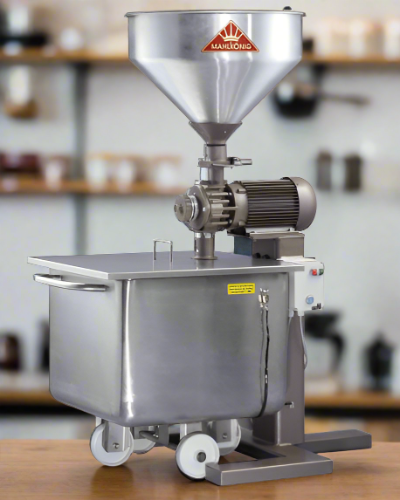Industrial Coffee Mill Overview: Boost Performance and High Quality
In the affordable landscape of coffee manufacturing, selecting the ideal commercial coffee grinder plays a crucial role in boosting both efficiency and item high quality. Understanding the nuances of numerous grinder types and essential functions-- such as personalized grind setups and durable construction-- can dramatically influence the final taste profile of the coffee. In addition, the optimization of the grinding process, coupled with thorough upkeep, is vital for maintaining efficiency over time. As we discover these crucial components, it becomes evident that the implications prolong past plain equipment choice, impacting overall organization success in manner ins which warrant closer assessment.
Recognizing Grinder Kinds
When choosing an industrial coffee mill, recognizing the different kinds offered is essential for optimizing both taste removal and functional effectiveness. The 2 main kinds of grinders are blade grinders and burr mills.

Ultimately, picking the right kind of grinder is indispensable to preserving top quality and effectiveness in coffee manufacturing, making it imperative for services to buy top notch burr mills for optimal results.
Trick Features to Think About
Picking an industrial coffee mill requires careful factor to consider of numerous key attributes that can considerably affect both efficiency and the total coffee experience. One of the main facets to evaluate is the grinding mechanism. Burr grinders are normally favored over blade grinders, as they offer a constant work dimension, which is important for ideal removal and flavor.
Another vital feature is the grinder's capacity. Relying on the quantity of coffee you require to procedure, pick a model that can manage your needs without giving up rate or top quality. In addition, think about the grind settings provided. A versatile grinder with multiple settings allows you to tailor the grind dimension to different developing methods, improving the coffee's flavor account.
Assess the mill's noise level, specifically in an active coffee shop or manufacturing setting, where excessive sound can be turbulent. Investing in a mill that balances these functions can significantly improve both functional efficiency and the top quality of the coffee offered.
Optimizing Grinding Refine
To attain the ideal outcomes in coffee prep work, enhancing the grinding procedure is essential. The grind dimension significantly affects extraction, flavor, and general high quality of the brewed coffee. Various developing techniques call for certain grind sizes; for circumstances, coffee requires a fine grind, while French press requires a crude structure. Understanding the connection between work dimension and developing method is the initial step in optimization.


In addition, keeping an eye on the grinding speed can enhance the process. Slower grinding commonly produces less heat, protecting delicate tastes and scents. Alternatively, quicker grinding might create too much warm, negatively influencing the coffee's quality.
Upkeep and Treatment Tips
Appropriate maintenance and treatment of commercial coffee mills are vital for guaranteeing optimum performance and long life. Regular cleaning is the structure of maintenance; residue buildup Source can affect taste and grinding effectiveness. It is suggested to cleanse the grinder after each use, wiping down the exterior and removing any coffee grounds from the burrs.
In addition, inspect the grinding burrs for deterioration. Boring burrs can endanger grind consistency, so they must be changed as essential. Industrial Coffee Grinder. Occasionally adjusting the grinder is additionally vital, as this preserves the preferred work dimension for different brewing techniques
Lubrication of moving parts need to be executed according reference to the supplier's specs, as this lowers friction and lengthens the life of the equipment. It is vital to use food-grade lubes to make sure safety and conformity with health guidelines.
Lastly, maintain the grinder in a dry and secure atmosphere to stop corrosion and deterioration. By sticking to these upkeep and treatment ideas, operators can boost the performance of their commercial coffee mills redirected here while guaranteeing top quality result and extended functional life.
Roi Analysis
Reviewing the roi (ROI) for industrial coffee grinders is important for services looking for to maximize their coffee manufacturing capacities. A detailed ROI analysis aids determine the economic stability of purchasing top notch mills, allowing companies to evaluate the preliminary expenses versus prospective gains.
To carry out a detailed ROI analysis, organizations ought to consider several vital aspects. Initially, evaluate the acquisition price of the mill, including installation and any type of needed alterations to existing infrastructure. Next, compute operational prices, consisting of energy usage, upkeep expenditures, and labor effectiveness improvements. High-performance grinders typically result in minimized grinding time and increased throughput, which can considerably boost productivity.
Additionally, take into consideration the impact on item high quality. Industrial Coffee Grinder. Superior mills produce a more regular grind size, which can enhance taste accounts and consumer fulfillment, eventually driving sales. By boosting the high quality of the final product, services can validate higher pricing, leading to boosted revenue
Verdict
In recap, an industrial coffee mill plays a critical function in enhancing both effectiveness and product high quality within coffee production. By choosing top notch burr mills furnished with essential functions such as adjustable grind setups and long lasting construction, companies can ensure optimal flavor removal. Regular maintenance is essential for maintaining grinder efficiency and maximizing client contentment. Eventually, the calculated investment in a trusted grinder adds significantly to enhanced income and competitiveness in the coffee sector.
In the competitive landscape of coffee production, selecting the right commercial coffee mill plays a critical duty in improving both effectiveness and item quality. The 2 main types of mills are blade mills and burr grinders. Within the burr grinder group, there are level burr grinders and cone-shaped burr mills, each with its advantages. Burr mills are normally chosen over blade mills, as they give a regular grind dimension, which is important for ideal extraction and flavor.
In summary, a commercial coffee grinder plays a pivotal role in enhancing both performance and item top quality within coffee manufacturing.